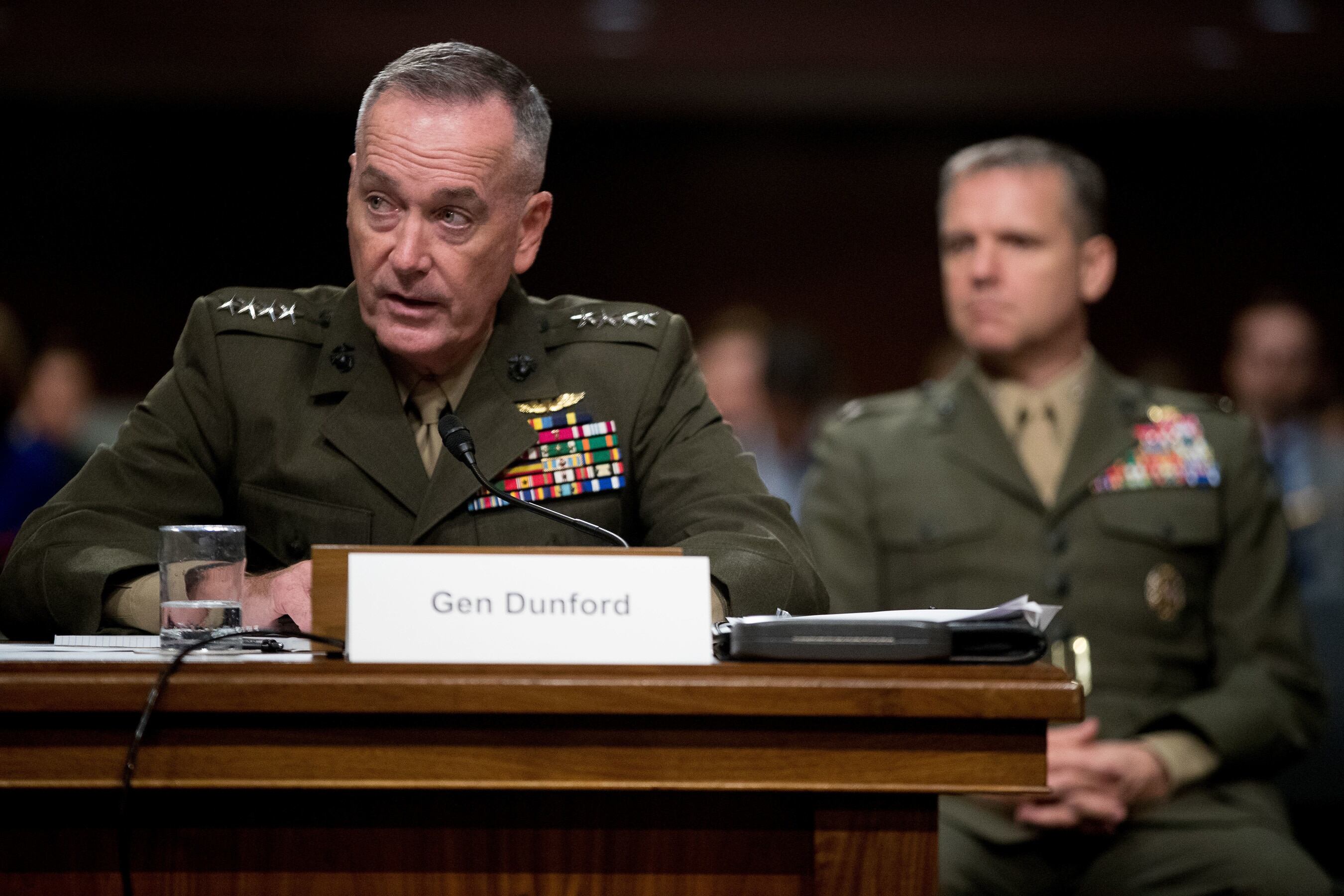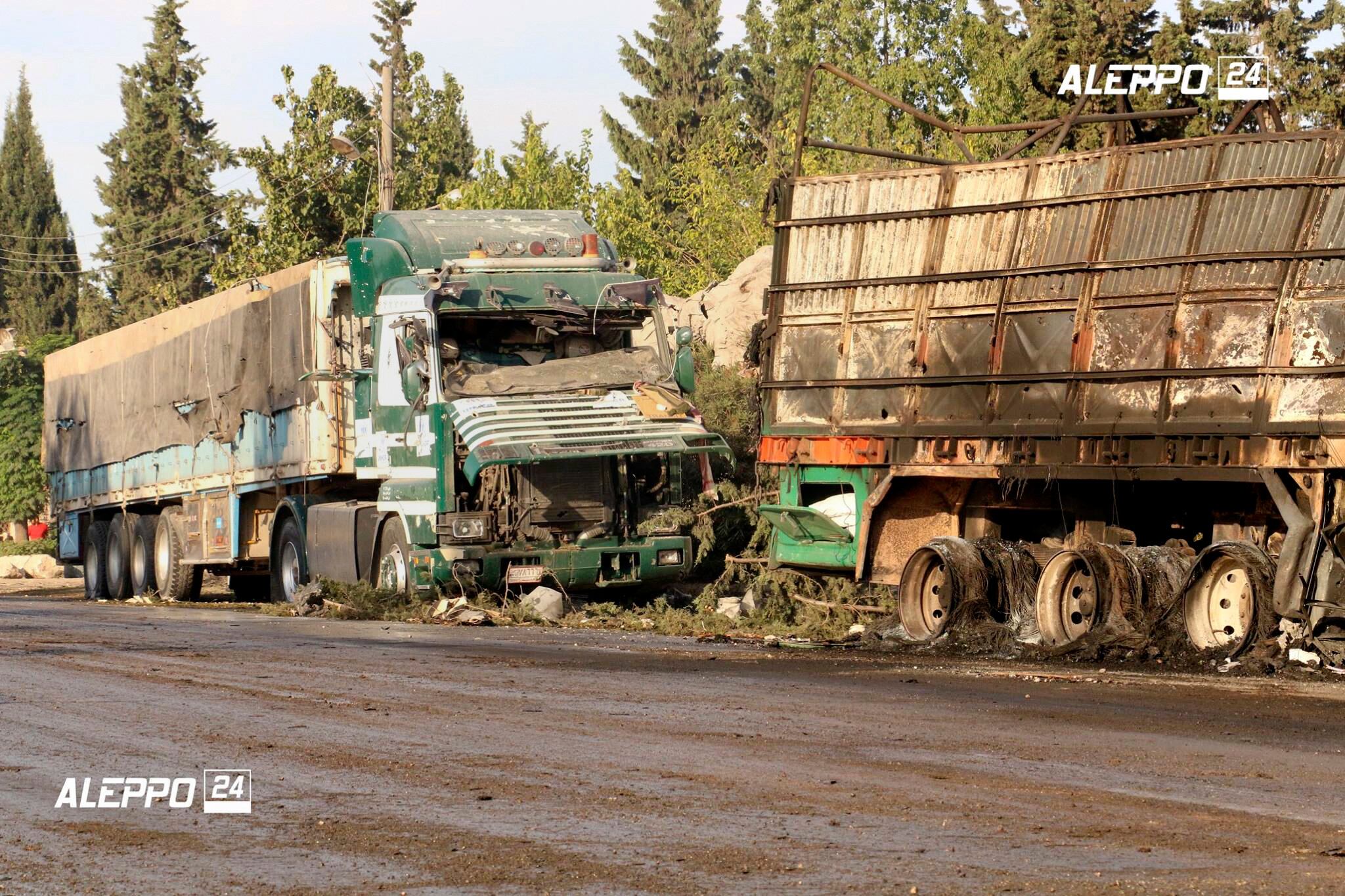WASHINGTON — The nation's top U.S. military officer told lawmakers Thursday there's no doubt in his mind that Russia is responsible for the airstrike on a humanitarian aid convoy in Syria, and he called the attack an "unacceptable atrocity."
U.S. Marine Gen. Joseph Dunford, chairman of the Joint Chiefs of Staff, said during testimony before the Senate Armed Services Committee that there were two Russian aircraft in the area of the strike when it happened. Syrian government aircraft were also nearby, he said. Dunford said he's not certain which of the two Russian aircraft dropped the bombs, which killed 20 civilians.
During a wide-ranging hearing, Dunford also said the Obama administration is considering directly arming the Syrian Kurds whom the U.S. has been backing in the fight against the Islamic State.
"They are our most effective partner on the ground," Dunford said of the battle-hardened Kurds, who are senior partners in an opposition group the U.S. calls the Syrian Democratic Forces.
Dunford said it "is very difficult" to manage the balance between supporting the Kurds and dealing with the Turkish government's adamant opposition to that support. Turkey sees the Kurds as a long-term political threat.
Asked whether arming the Syrian Kurds is a viable military option, despite the Turkish government's opposition, Dunford said "reinforcing" the Syrian Democratic Forces' military capabilities "will increase the prospects of our success" in enabling the recapture of Raqqa, the defacto Islamic State capital in Syria.
Dunford and Defense Secretary Ash Carter faced Republicans angry that the Obama administration is not taking more aggressive steps to end the 5-year-old-civil war in Syria. Sen. John McCain , R-Ariz., the committee chairman, accused Secretary of State John Kerry of being "intrepid but delusional" for trying to work with Russia to secure long-term peace in Syria.
A Sept. 9 temporary truce in Syria brokered by the U.S. and Russia has all but collapsed as the two countries blame one another for the latest failure. The cease-fire envisioned a military partnership between the two countries against the Islamic State and al-Qaida if violence was reduced and aid delivered over the course of seven continuous days. The Pentagon, however, voiced reservations about coordinating air strikes and sharing intelligence with Russia.
Republicans are skeptical, even hostile, to the idea that Russia is a willing partner for peace and would work with the United States. Dunford told the committee that he does not believe it would be a good idea for the U.S. military to share intelligence with Russia in Syria.
McCain assailed the potential partnership, saying it would "mean that the U.S. military would effectively own future Russian airstrikes in the eyes of the world."

Joint Chiefs chairman Gen. Joseph Dunford testifies on Sept. 22, 2016, at the Senate Armed Services Committee hearing in Washington.
Photo Credit: Andrew Harnik/AP
Tensions between Russia and the United States have only increased in recent days after a senior U.S. official said Wednesday, prior to Dunford's testimony, that the U.S. had a very high degree of confidence that the attack was carried out by a Russian-piloted aircraft. The official wasn't authorized to discuss the issue publicly and spoke on condition of anonymity.
The assessment laid more deliberate blame on Moscow for the strike on the Syrian Arab Red Crescent convoy, which killed 20 civilians.

This image provided by the Syrian anti-government group Aleppo 24 news, shows damaged trucks carrying aid, in Aleppo, Syria, Tuesday, Sept. 20, 2016. A U.N. humanitarian aid convoy in Syria was hit by airstrikes Monday as the Syrian military declared that a U.S.-Russian brokered cease-fire had failed, and U.N. officials reported many dead and seriously wounded.
Photo Credit: Aleppo 24 news via AP
Officials had said Tuesday that Russia was to blame, but that the strike delivered by a Russian-made Su-24 could have been carried out by Russia or Syria. Both militaries use Su-24 fighter jets. But officials said Wednesday the U.S. has gathered enough intelligence to say that it was Russia, not Syria, that launched the airstrike.
Kerry called for all warplanes to halt flights over aid routes and at a U.N. Security Council session he raised "profound doubt" about the willingness of Russia and Syria to abide by the cease-fire.
Carter and Dunford both disagreed with a Kerry proposal to ground all warplanes. They told the committee the U.S. should not discontinue flying aircraft over Syria. Dunford said he sees "no reason to ground our aircraft" and that the U.S.-led coalition needs to maintain pressure on the Islamic State group.
Associated Press writer Robert Burns contributed to this report.




